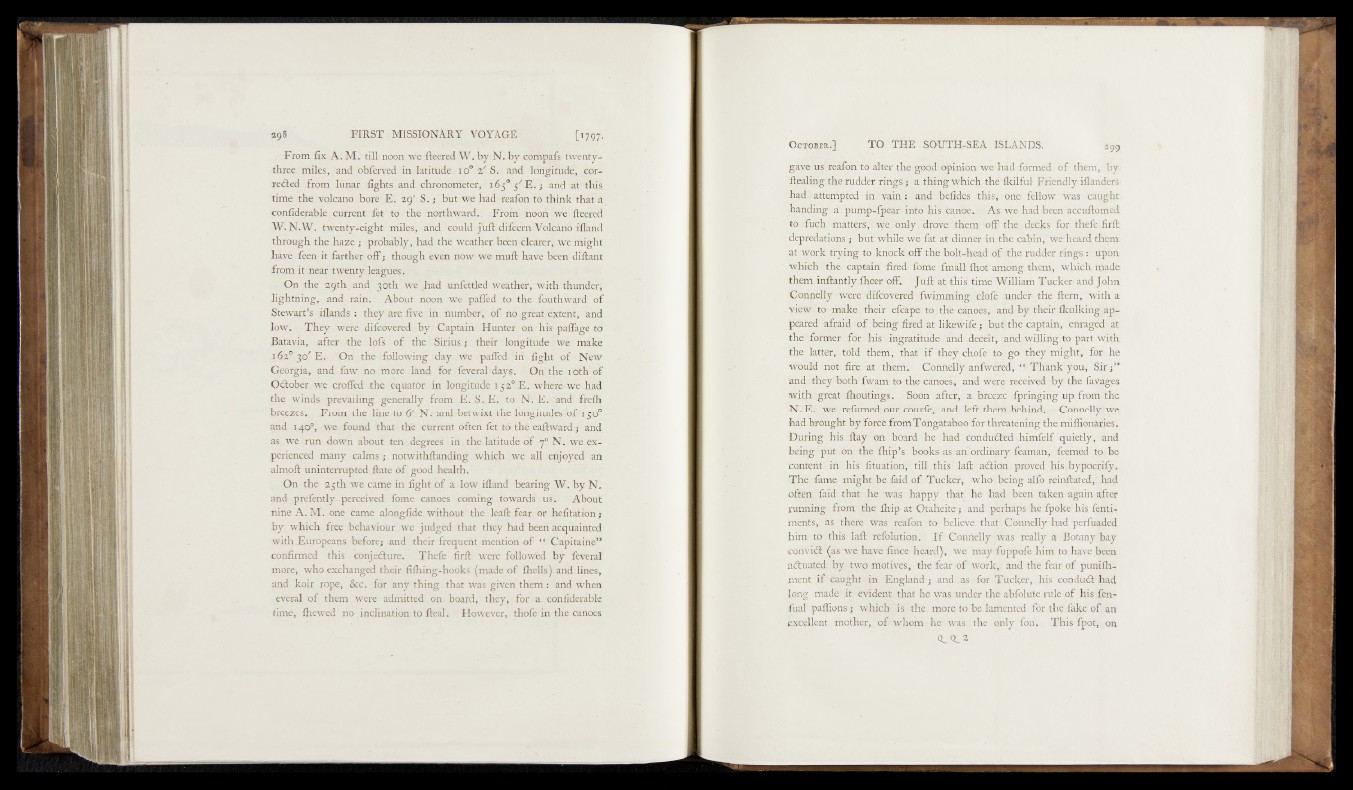
From fix A . tills noon we fteered W .rbyi-hCbycbrhp&fs twenty-
!three - miles, 'and lobfervedlin*latitude SW apd 'ddfigirade; cor-
‘redteR•, ftonj.»lunar ; fights and chronomctu, 165*^5^'. $ 'and
time Tthej volcano! shore! E . 2'9V§;.jjrbut we ha^ffeafon-tojt bink tHat^'a
Gonfifidrable’ .current let to the northward". From’ tfebon ftfiered
W .N .W . twenty-eight' mStles, anddctMidRijuft: difcernrVoIeanb 4fiaifid
thrqgggh'the haze ;-probably, had the. weather/been: clearerf.we sdighit
have feen it farther off; though even qoyv£y?e m f t have been- dfftarit
-fronj it near ttyentyjl^agues.r
,r /Ph |the 29th andfljQth'wej.had unfettledrweathbf, witH!fhun'der}
lightnjpg^. and ram." About noon wfe-’pafled toitheiT^thward o f
Stewart's iflands : they are five in number; o f h&gfeatje’Xtefe«, > :‘and
lory. '-T h e y , were dHeovered byr/Captain' Hunterdon«■ h is ‘pUfiage 'to
Batavia, a fte r th e elofs | ofr theJSiriiis;| their ~k>i^itude#We --maRd
162^.30'’E. On the following day we pafied in fight of New
Georgia, and-few no more land for feveral "days'. | On the 10th of
October we crofted the equator in lorigfitude x^2° E. where we had
the winds prevailing generally from E. S_. E. to N. E. and frefh
breezes. From the line to 6° N. and betwixt the longitudes of 150°
and 140°, we found that- the current often fetrto: the eaftward; and.
as we run down about ten degrees In the latitude of 70 N. we experienced
many calms; notwithftanding -whiohlwe>alh'e^fe)T^®^an
almoft hmnigrrupted Rate of! goodhealth.
On fh6 25th we came in fight o f la- low ifland bearing .W.'by'N.
and prefently perceived foine canoes coining towards us. About
nine A. M . one came alongfide. without the leaf! fear or hefitation;
by which free "behaviour we judged , that they had been acquainted
with Europeans before} -and their frequent mention of ‘ Capitaine”
confirmed- this conjecture. Thefe firft were: followed by feveral
more, who exchanged their fifhing-hooks (madegj|j|Ihells) and lines,
and koir rope, , &c. for any thing, that was given them : and when
everal of them . were admitted- on- board, they, for a . confiderable
time,- ihewed n o . inclination to deal. However, thofeih the canoes
gave us reafon to alter the good opinion we had formed .of them, by
dealing the rudder rings; a thing which the fkilful Friendly ifianders-
had attempted in vain: and-.'befides this, one. fellow was caught-
handing a pump-fpear into his canoe. As. we, had been aceuftoihedt
' t6 ;fiaeh'’» 'fiaatter'jfsi^efbMy^drbvei them o|p the., decks for thefejirft
'depiedatioiisV"lu<t "while vtMIt'fehdmnu metric cabmr^t licaiil themi
at yorh trvmg to-knots Midi the bolt-h^ad 'cftStheftindder- rih:gst:bj2^bn
wRieh^yheycaptam fired^fanfe timalk'’fnb1^^^Mg,'|hem, whlitji) n^dfe
them,ii^antiydhefei;loft.1 ir-jnft afefehib -time WillL^gr Tucker? and John.
tGkameily '"W^ere-idii^iver^l} fwimndrigstdo^sunder fMe fiern, ‘Jsyith a
yieiw® to make* their .'efespeg t®ytfiel®i@®|i^and’iby ttb.extlfficiflkJn^apj.
'pdared rfraid'’6fLheing»’fifed^at^4ifeewiR35 huMhS^^^n^*ehrage®ati
thejffiJr^er?rfsMhis*ihgrsttitudel;^fld’'fdf^ffirand{ijylihngito^part with
the ISttcffi'rtiild p M 5p h a # 5l^'flK f nc b ti^S -g o ,J'tbt v -might; fon-.he
i^Mid-yi0.tr^re'->?at • them. .Connelly1 anfweied, ‘i Tbankl^u.} Sir
anftEtlre-y'bokh fw^ovtoiitbetcdnOeSs ’a^iw^&eGe^rqd^by the fa^ges
ydtb great'Rjoutings. ySadn rafitef,!, 'a? hi^^<tfpij^i|tghp'|fron®th'e
N3-fik| jwe!: refemedrour. ctor ; and. leftlth^fesHehind: Uwwq -
Md brought by force from TongMahh Stfor threatening flhe rinffidn^fjes1;
^During His. flay' on '-board« henh%dicc^du§iedrdrimfelf qftiefclyirvand
beihjg- putJiop?}thefdb’ip^ ’ booksvas^anl©rdin^ry feaman,s feemed tfe’be
cxadbftfihinr>hEi fifeudron,. tifla-sthis daft - adtjjcplj pE0t^?'-*lfts{hyn'OjG.^fyS;
tfibei, fame .might befeid q£ Tucker,' Iwho^fieing. alfo feinfiatecl,fjhad
ofteniffaid'^tha.ty ,he was happy thatl®p-hadibeen itahentagain ^ter
running from the fiiip at Otaheite ; and perhaps he fpoke his fenti-
ments, as there was reafon to -believe that Connelly had perfuaded
him to this laft refolution.' If Connelly was really a Botany bay
convid: (as :we have fince heard), we may fuppofe him to have been
actuated -by two motives, the fear of work, and the fear of puniih-
ment if caught in England; and as -for Tucker, his condudt had
long made it evident that he was under the abfolute rule of his fen.-!
fua| paffions; which is the more' to.be lamented for the fake o f an
excellent mother, of whom he was. the only foil. This fpot, on
I